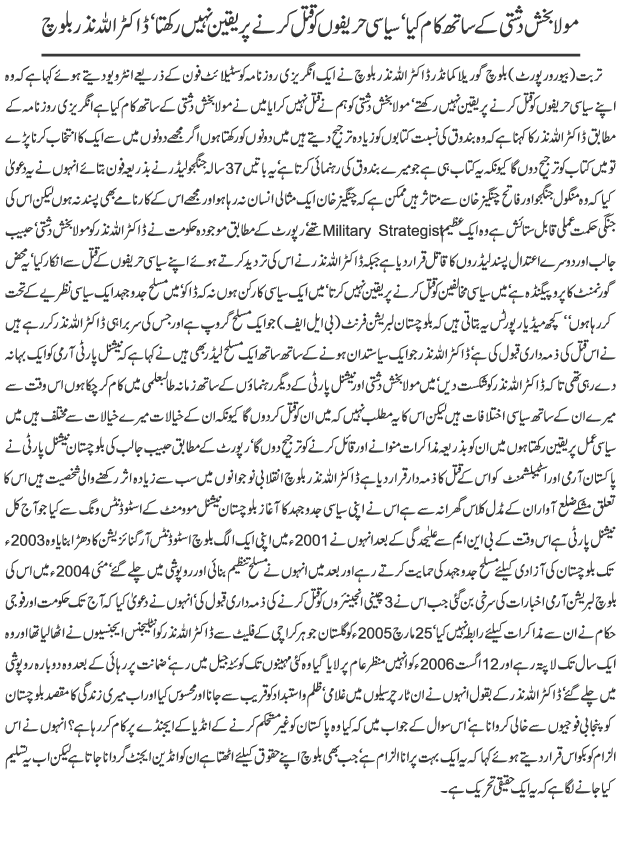In an exclusive interview, Baloch militant
leader Dr Allah Nazar rubbishes allegations of
killing moderate Baloch politicians as
propaganda
Oct 4th, 2010 By
Sajid Hussain
Strangely, Dr Allah Nazar prefers
books to guns. "I'd like to have both though. But if
I have to choose one I'll prefer the book. It's the
book which guides my gun," the 37-year-old militant
leader tells this scribe via satellite phone from an
undisclosed location.
Claiming to derive inspiration from
Mongol warrior and conqueror Changez Khan, he says,
"Changez Khan may not be a perfect human being and I
don't like much of his actions, yet I admire his war
tactics. He was a great military strategist."
Dr Allah Nazar, blamed by the
government for the assassination of Maula Bakhsh
Dashti, Habib Jalib and other moderate politicians,
has denied killing his political opponents. "It's
the government's propaganda. I don't believe in
eliminating political opponents. I'm a political
worker, not a bandit and I've taken up arms for a
political ideology," he stresses.
Apart from the government and
military authorities, the National Party (NP) has
also held Dr Nazar responsible for the murder of its
leader Maula Bakhsh Dashti in Turbat. Some media
reports suggest the Balochistan Liberation Front (BLF),
a militant group believed to be headed by Dr Nazar,
claimed responsibility for the killing. However,
this politician-cum-militant leader says the NP was
providing "an excuse to the military to knock him
out".
"I've worked with Maula Bakhsh
Dashti and other leaders of the NP during my student
life. I've had political differences with them since
then, but it doesn't mean I'll kill them for having
ideas other than mine. I believe in political
process and I'll prefer to persuade them through
dialogue."
"Even Jalib Sahib's Balochistan
National Party has held Pakistan military and
intelligence outfits responsible for his
assassination."
Believed to be the most influential
figure among the radical Baloch youth, Dr Nazar
belongs to a middle-class family from Mashkay, a
town in the Awaran district, Balochistan. He started
his political career as a member of the students'
wing of the Balochistan National Movement (BNM), now
the National Party. After parting ways with the then
BNM, Dr Nazar formed his own faction of the Baloch
Students Organistaion in 2001. He openly advocated
an armed struggle for liberating Balochistan till
2003 -- when he went into hiding to organise his own
militant group. His Baloch Liberation Front (BLF)
made headlines when it claimed responsibility for
killing three Chinese engineers in Gwadar on May 2,
2004.
He claims he has never been
approached for talks by the government or military
authorities.
Dr Nazar was picked up by
intelligence agencies on March 25, 2005 from a flat
in the Gulistan-e-Jauhar area in Karachi. After
having remained missing for around year, he
resurfaced on August 12, 2006 and was jailed in
Quetta for several months. After his release on
bail, he went into hiding again, where he says he
"witnessed slavery and oppression very closely in
those torture cells," says a bitter Dr Nazar. And
now "The aim of my life is to purge Balochistan of
Punjabi Army."
Does he work on an Indian agenda to
destabilise Pakistan? He rubbishes this allegation
and adds: "It's now an outdated allegation. Whenever
the Baloch rise up for their rights, they are dubbed
as Indian agents. But it has now been acknowledged
that it's an indigenous movement."
So then where does he get cash and
weapons from to run his militant group? He says he
would appreciate any help from anyone -- but would
not work in "anybody else's interest, except Baloch".
He reveals Baloch women have also
joined them in their fight against, what he calls,
slavery. "According to my estimate, we enjoy the
support of 80 percent of the Baloch masses. And the
popularity of our cause is growing with each passing
day," adding the Baloch Liberation Front,
Balochistan Liberation Army, Baloch Republican Army
and other lesser known Baloch militant groups will
unite at a later stage to wage a more organised and
sophisticated war for Balochistan's independence.



